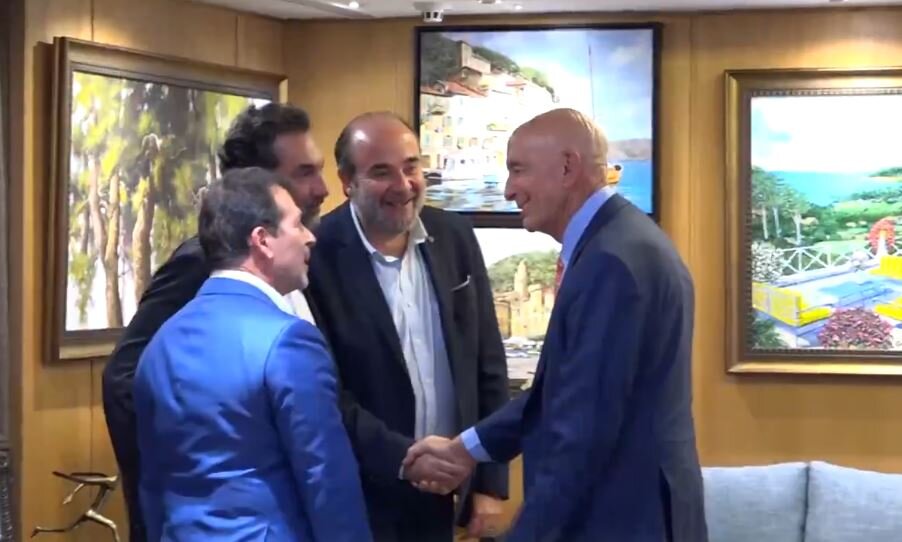Washington intensifying pressure on Lebanon ahead of parliamentary polls

BEIRUT — While Lebanon was awaiting Washington’s position on the latest response to Thomas Barrack’s approach to the arms monopoly, the U.S. envoy warned the Lebanese government to “act immediately.”
On X, Barrack’s wrote: “The credibility of Lebanon’s government rests on its ability to match principle with practice. As its leaders have said repeatedly, it is critical that ‘the state has a monopoly on arms.’”
The envoy added, “As long as Hezbollah retains arms, words will not suffice. The government and Hezbollah need to fully commit and act now in order to not consign the Lebanese people to the stumbling status quo.”
During his recent visit, the American presidential envoy deliberately ignored any talk of any guarantees that Israel will not launch attacks on Lebanon.
Analysts therefore interpreted his tweet as pessimistic about the course of events, as it became clear that Hezbollah would not surrender its weapons and was merely seeking to buy time, betting on the repercussions of events in southern Syria, where Israel is seeking to further divide the country quickly.
However, some analysts believe Washington should be cautious, as the current phase requires preserving the HTS–led government to achieve several goals, most notably the complete elimination of what it calls “Iranian influence,” in addition to cutting off military supplies to Hezbollah, as well as building a solid barrier separating Syria from Iraq.
According to these analysts, division and chaos are not feasible because they will give Tehran (and Hezbollah) an opportunity to regain its presence in Syria. Over the past decades, Iran has demonstrated its ability to harness adversity to its advantage.
Experts expect the coming weeks to witness an escalation of financial and economic pressure on Lebanon, in parallel with assassinations and attacks, especially ahead of the launch of campaigns for the May 2026 parliamentary elections, which Washington wants to produce a parliament aligned with Israeli interests.
The presidential office announced that President Joseph Aoun “personally contacted Hezbollah to resolve the arms issue,” indicating a positive response to the ideas proposed in this regard.
Regarding the electoral process, Aoun stressed the importance of holding parliamentary elections on their constitutional date, noting that “the representation of Lebanese diaspora is a matter for Parliament.”
Meanwhile, the conflict is escalating over the implementation of Article 112 of Law 44/2017, which allocates six seats to non-residents of Lebanon, provided that they may not vote for candidates for the 128 seats in Lebanon unless they decide to vote inside Lebanese territory.
Maronite Patriarch Bechara al-Rahi’s recent stance has fueled conflict among Christian factions, while supporting the Lebanese Forces’ position by stating that “limiting expatriates to six parliamentary seats contradicts the principle of connecting them to their homeland, their land, and their families, and their participation in Lebanese political life.”
Patriarch al-Rahi claimed that this issue “is a process of exclusion that negates the natural right of expatriates to vote in all electoral districts... Diaspora residents aspire to participate in the upcoming parliamentary elections with complete freedom in their electoral districts wherever they are registered in Lebanon. To protect internal unity, this article must be repealed from the current electoral law.”
Quickly, the Lebanese Forces exploited al-Rahi’s stance, with its MP George Okais implicitly threatening to disrupt the elections if Article 112 is adhered to.
It is worth noting that the largest number of expatriate voters were Christians, due to the pro-Resistance diaspora’s (especially Lebanese Shiites) fear of prosecution and intimidation.
According to a study prepared by International Information researcher Muhammad Shams al-Din, France topped the list of countries with the highest voter turnout, with approximately 20,000 registered voters in the 2022 elections.
The UAE came in second place (18,119), followed by Canada (18,023), the United States (15,740), Australia (11,744), Germany (8,811), Saudi Arabia (6,564).
This comes amidst Nawaf Salam’s government’s abdication of its electoral responsibilities as he returned from Paris with a proposal he conveyed to Speaker Nabih Berri, calling for a special cabinet session to announce Lebanon’s commitment to implementing the decision to monopolize arms control in the hands of the state.
Salam justifies his position by claiming that this will help obstruct the withdrawal of UNIFIL from the south and prevent Washington from declaring escalatory positions that could serve as cover for a new Israeli aggression against Lebanon.
UNIFIL’s mandate is scheduled to be renewed at the end of next month as part of a campaign to blackmail Lebanon into amending its role, giving it absolute freedom to search any location without Lebanese army escort, a demand primarily from Israel.
Barrack’s threats are accompanied by an anti–Resistance media campaign at the request of the American embassy in Beirut, which emphasized to those whom Barrack met that they must exert the harshest pressure on Hezbollah.
This prompted Druze leader Walid Jumblatt to say, “Hezbollah must be convinced that retaining heavy weapons will bring disaster to Lebanon.”
Leave a Comment